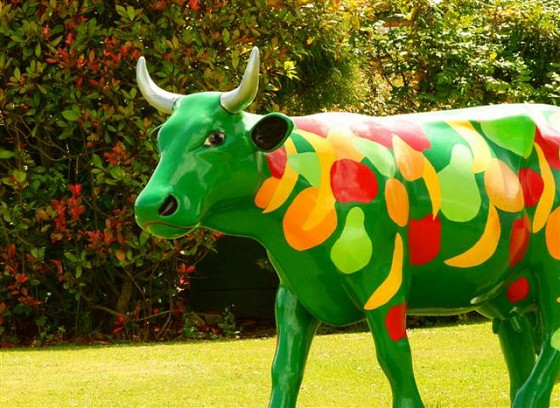 Long-standing myths about the deficits of vegetarianism are herein debunked.
Long-standing myths about the deficits of vegetarianism are herein debunked.
Good news! Going vegetarian won’t leave you with a protein deficiency or put you at risk for developing gout. We’re going to put those rumors to rest so that you can stop wondering and worrying and get started down the road to better health.
Myth 1: Vegetarians have trouble getting enough protein.
Nearly every food that we consume contains some protein. Healthy vegetarian sources of protein include eish balady (Egyptian local bread), oatmeal, falafel, tofu, mock meats, lentils, nuts, soya milk, leafy green vegetables and beans (eg, black beans, garbanzo beans and kidney beans).
Eating too much protein – especially animal protein – can put a strain on your kidneys and lead to kidney disease. A diet high in protein can also rob your body of calcium and increase your risk of developing osteoporosis.
Many people incorrectly believe that vegetarians have to combine certain foods at each meal in order to form “complete proteins”. But if you consume a balanced diet and eat a variety of grains, beans, vegetables, nuts and seeds, you’ll have no trouble getting all the protein your body needs.
Myth 2: Eating fish and other sea animals is good for you.
If you wouldn’t drink seawater, you shouldn’t eat sea animals. The flesh of some sea animals, such as crabs, calamari, tilapia and shrimp, has been found to be 9 million times more toxic than the water they live in.
The flesh of many sea animals is laden with polychlorinated biphenyls (PCBs), DDT and dioxin. Sea animals also ingest sewage, which contains dangerous bacteria such as E. coli. Serious and even fatal cases of food poisoning have resulted from E. coli contamination. Dangerous amounts of heavy metals and minerals – including cadmium, mercury, lead and chromium – have been found in the flesh of sea animals. The flesh of some sea animals even contains arsenic! Consuming these toxins can cause birth defects, various types of cancer and damage to the liver, kidneys and nervous system.
Although fish flesh does contain healthy omega-3 fatty acids, it’s much safer to obtain omega-3s from plant sources, such as walnuts, broccoli, cabbage, kale, soya milk, tofu, flaxseeds and flax oil.
Myth 3: Dairy products are a good source of calcium and are essential for bone health.
As healthy sources of calcium, dairy products can’t compare to tofu, beans, almonds, tahini, soya milk, seaweed, beans and grains. The calcium-absorption rate of milk is approximately 32 percent. Broccoli and other leafy green vegetables have calcium-absorption rates between 40 and 61 percent. When it comes to calcium, absorption is key!
A 12-year study of nearly 78,000 women found no evidence to support the claim that milk builds stronger bones. However, studies do show that the animal protein in dairy products actually increases the risk of developing osteoporosis!
Why does cow’s milk, which is supposed to be good for us, put so much stress on our bodies? Because it’s designed for baby cows! Humans are the only animals who consume milk from other species; no other species consumes any kind of milk past infancy. Dairy products are laden with cholesterol, saturated fat and an ever-increasing variety of pesticides and antibiotics. The consumption of dairy products has even been linked to heart disease, intestinal problems, obesity, diabetes and various types of cancer. It turns out that milk isn’t so good for us after all!
Myth 4: A vegetarian diet increases the risk of kidney stones and gout.
Gout, or metabolic arthritis, is the result of crystallized uric acid deposits in the joints and cartilage. The symptoms of gout include joint pain and stiffness. Scientists at the University of Bonn in Germany have found that eating a vegetarian diet can actually reduce the risk of gout. The study, published in the European Journal of Nutrition, compared the risk of uric acid crystallization for three different diets: a typical Western diet (ie, one containing excessive animal protein), a healthier omnivorous diet and a vegetarian diet. Study participants who consumed a vegetarian diet showed the lowest risk of uric acid crystallization – 93 per cent lower than the participants who consumed a typical Western diet.
A study conducted by scientists at the Center for Mineral Metabolism and Clinical Research in the US has proved that the rumor that a vegetarian diet causes kidney stones is also untrue. The study found that people who consumed a diet based on animal protein actually have a higher risk of developing certain types of kidney stones than those who consumed a diet based on vegetable protein – even when both groups consumed the same amount of protein. The scientists also noted that participants who consumed diets based on animal protein were at higher risk of developing osteoporosis.
Myth 5: Eating meat is the best way to get iron.
Nonsense! Iron is available in all kinds of foods – from beans to whole-wheat bread – and is particularly plentiful in breakfast cereals, oatmeal, nuts, peanut butter, seeds, molasses, mock meats, tofu and leafy green vegetables (such as spinach).
A study published in the American Journal of Clinical Nutrition found no significant difference between the anemia (ie, iron deficiency) rates of meat-eaters and vegetarians. A study conducted at Harvard University found that consuming the type of iron found in meat, eggs and dairy products can actually increase the risk of developing diabetes.
If you’re already a vegetarian, these myth-busting responses are great to keep in hand for the next time your die-hard meat-eater colleague is grilling you. If you haven’t gone vegetarian yet, quit making excuses – take a proactive step for your health and for animals by ditching meat and other animal-derived products! With so many options available these days, it’s easier than ever to switch to a vegetarian diet!
More Food and Health news:
Bee Stings Are Sweet in Israel: An Interview with a Beekeeper
RECIPE: Compote, A Cool Healthy Dessert For Summer
Complications of Coffee – A Habit Worth Kicking




Cindy Katz is right on the money.
Those who want to help the environment and their own health need to find sources of local pastured meats, wild fish, free-range eggs, and lots of organic fruits and vegetables.
http://www.guardian.co.uk/commentisfree/2010/sep/06/meat-production-veganism-deforestation
Thanks for your comments: we appreciate our readers and your input is valuable. Especially interesting are your comments about omega 3’s and soy products.
However, I think “riddled” and “deceptive” are strong adjectives; also, apart from pointing out the harmful effects of certain dairy products, Mr. Baker has not advocated veganism.
Finally, this discussion does not emphasize the numerous environmental reasons for choosing to consume less or no meat.
Thanks for your comments: we appreciate our readers and your input is valuable. Especially interesting are you comments about omega 3’s and soy products.
However, I think “riddled” and “deceptive” are strong adjectives; also, apart from pointing out the harmful effects of certain dairy products, Mr. Baker has not advocated veganism.
Finally, this discussion does not emphasize the numerous environmental reasons for choosing to consume less or no meat.
This article is riddled with nutritional misinformation. If you want to be a vegetarian for ethical reasons (as the writer of it, an employee of PETA obviously supports) by all means, but do not disguise an animal rights agenda as a nutritional one.
There is a lot of dangerous and out dated information here, but I’ll only mention two examples. One, walnuts, broccoli, cabbage etc are all great sources of ONE type of omega 3 fatty acid- ALA, however, they DO NOT supply the other two types of omega 3’s (DHA, and EPA) both of which are imperative especially to pregnant woman and are ONLY found in fish oil. If you do not want to eat fish for ethical reasons, that is fine, but take fish oil supplements, esp if pregnant.
Secondly, there is nothing good about soy milk or other (unfermented) soy products. The use of soy as a “health food” is one of the greatest marketing ploys by the soy industry the United States has seen. Soy in large amounts is an endrocrine distruptor and is probably linked to early onset of puberty in young girls. Additionally, soy milk is riddled with sugar- if you do not want to drink milk for ethical reasons, again, fine, but learn to make nut milks at home and skip the sugar.
For many people out there a vegetarian diet will prove more healthful than the American standard of hormone added meats, and dairy products. However, a non vegetarian diet consisting of “real food” that is not produced in labs, covered in pesticides or injected with hormones can also be a ticket to health. Don’t blame the cow for the problems of the industrial revolution.
I have no argument with those who elect a veggie or vegan diet due to ethical concerns- but I do have a problem with a people who disseminate false nutritional information as a way to promote it. This practice is deceptive and dishonest and ultimately, harmful.
Last point- man has been a hunter-gatherer for 1,000 generations, a farmer for 500, and a post-industrial revolution eater for 10 generations. There is no argument for veganism based on the history of man and the evolution of our eating (although vegetarianism has more of a precedent). Stick to personal ethical arguments if you want to promote veganism.